150 Years Ago Today, The Bloodiest Day In American History
Today is the anniversary of a significant turning point in the Civil War.
A century and a half ago today, the United States witnessed the bloodiest single day in its history:
On this morning 150 years ago, Union and Confederate troops clashed at the crossroads town of Sharpsburg, Md. The Battle of Antietam remains the bloodiest single day in American history.
The battle left 23,000 men killed or wounded in the fields, woods and dirt roads, and it changed the course of the Civil War.
It is called simply the Cornfield, and it was here, in the first light of dawn that Union troops — more than 1,000 — crept toward the Confederate lines. The stalks were at head level and shielded their movements.
Cannon fire opened the battle with puffs of white smoke rising from the tree line, at the precise spot where men re-enacting the battle are firing artillery today.
Just 200 yards in front of the Union forces, Confederate troops from Georgia were flat on their stomachs. They leveled their guns and waited, and when the Union troops broke out of the corn, the Georgians all rose up and fired.
“The smoke, the noise, the artillery is crashing in from all directions,” says Keith Snyder, a park ranger at Antietam. “It’s just a concentrated terror.”
It was complete chaos in and around the cornfield, Snyder says, with people screaming and bodies everywhere. In that first phase of the battle, 10,000 soldiers were killed and wounded.
(…)
There was nothing special about these fields, or even this town. It had no strategic value. Gen. Robert E. Lee’s plan was to push his troops north, perhaps to Pennsylvania, fight a decisive battle, and pressure Northern politicians to sue for peace. Union troops marched from Washington and intercepted Lee.
“The thing about Antietam is it’s a very personal battle,” Snyder says. “The vast majority of combat here is done at very close range — 100 yards and closer. It’s savage and personal. So when you pop out, the enemy is right there.”
The battle itself happened almost by accident. Several days earlier, a Union solider had found several cigars wrapped in a piece of paper abandoned at what had been a Confederate camp site. It turned out that the paper contained General Robert E. Lee’s Special Order No. 191, which contained specific details of the locations and strength of Lee’s forces and how they had been divided up after crossing the Potomac. The information essentially gave the Union the opportunity to deliver a crushing blow to the Army of Northern Virginia by catching by surprise near the Maryland village of Sharpsburg. For once, General George McClellan realized what he had and pursued Lee, although he foolishly held back a significant part of his forces, thus eventually depriving himself of the opportunity to deliver that crushing blow and allowing Lee to fight to a draw and retreat safely back to Virginia. McClellan’s failure to pursue Lee’s damaged forces despite having more than enough reserve force to take them on finally gave President Lincoln the excuse he needed to fire McClellan, who had frustrated him and much of official Washington since he took over command of Union forces a year before.
Despite the fact that it was not a clear victory, though, the Battle of Antietam was considered enough of a success for Abraham Lincoln to issue, some five days later, the Emancipation Proclamation, which would become effective on January 1, 1863. Lincoln had decided to draft the Proclamation in July 1862, in part to lend a new vigor to what had become a dispirited Union war effort and in part to appeal to those in Great Britain who abhored the South’s slavery in the hope that it would dissuade the British from openly backing the Confederacy. However, Lincoln knew he couldn’t do so until the Union had scored a convincing success on the battlefield, which was decidedly lacking in 1862. What happened at Antietam allowed him to do that, and changed the course of the war, and American history.
This wouldn’t be the last time that the Army of Northern Virginia would cross the Potomac, of course. Less than a year later Lee would do it again and make it as far as Gettysburg, Pennsylvania where he met General George Meade and the Army Of The Potomac and fought a three-day pitched battle that proved to be the high point for the Confederacy militarily. The 1862 crossing was more important, though, because it was being watched by England and France, who were still on the fence over whether or not to intervene in the American Civil War by lending support to the Confederacy and essentially forcing Lincoln to agree to peace terms that would keep the CSA intact. Lee’s failure to achieve a decisive victory, made European intervention far less likely. Then, when Lincoln announced the Emancipation Proclamation, it became politically impossible for both nations to step into the conflict on the side of Confederates due to public sentiment against slavery at home.
All of this leaves open, of course, one of the great “What Ifs?” of the Civil War. But for the discovery of Lee’s Special Order, Confederate forces likely would have been able to regroup and slip further north. A battle would have been fought somewhere, but it would have been on far different terms. It just goes to show you how history often turns on something as simple as one of Lee’s officers leaving behind three cigars wrapped in a copy of his order.
Illustration via Wikipedia
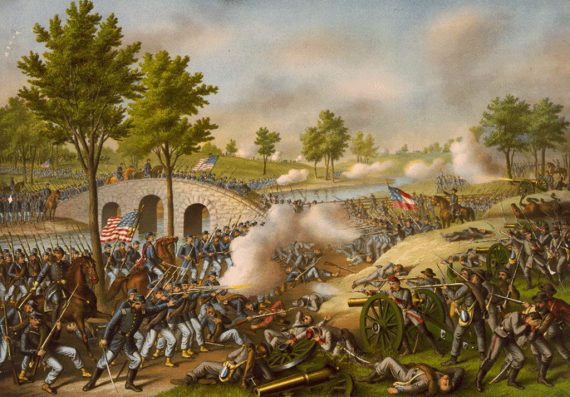

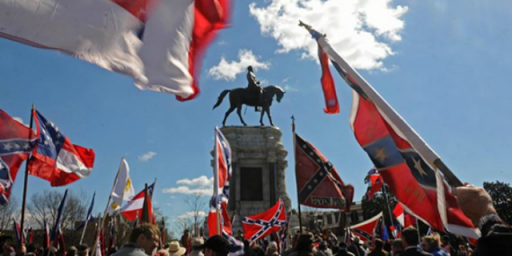
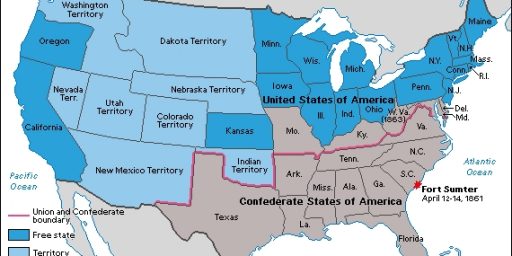
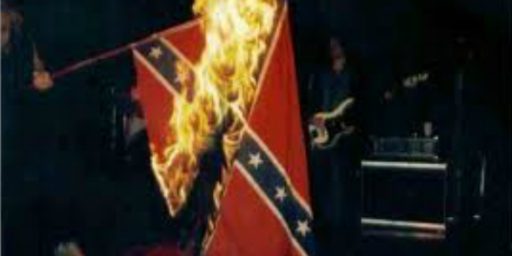
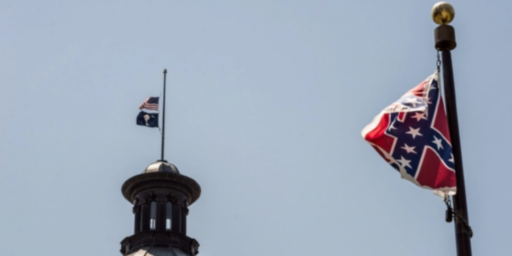
Today is also the 225th anniversary of the signing of the Constitution in Philadelphia. Btw Doug I prefer you use a little invective and refer to McClellan as incompetent and Lee as traitorous, it’s more accurate that way. As for the battle itself, some argue that the outcome was decisive in preventing British or French aid for the Confederacy as well as blunting Lee’s offensive in the Maryland Campaign as he was attempting to cut off railway supplying for D.C. and Baltimore.
The number of alternate history stories that hinge on finding Special Order 191 is staggering.
@Hoyticus:
I updated the post to address the international consequences that you point out. I should have addressed that originally.
And yes, McClellan was an incompetent boor who cared more about his legacy than the job he was given, while Lee was a traitor against his country.
@Vast Variety:
Harry Turtledove wrote a ten-volume alternate history series based on that.
@Doug Mataconis: Considering your prodigious blogging output, have you ever considered doing a live-blogging of the American Civil War or something of the sort? I’ve noticed that Brad DeLong does something similar to that with WW2.
@Hoyticus:
That would most assuredly be a prodigious effort. There are few accounts on Twtter that are doing something similar, but I get the impression they are a group effort. I’m not sure it’s something one person could do by themselves.
I can’t fault a general for being skeptical of finding the other side’s battle plans … it would smell to me of disinformation.
But there is so much *else* to loathe about McClellan.
@Doug Mataconis: I feel like you, James, and Steven with that much combined American history knowledge plus military knowledge/experience would make for an excellent live-blogging trio. Then add in the OTB commentariat and you could have a fairly vibrant discussion…as opposed to critiquing the last nutty thing some politician or talking head blurted out.
@Anderson:
Indeed there is. His conduct during the Peninsula Campaign was ridiculous, and his often quite open contempt for his Commander In Chief was so extreme that it made the things that got Stanley McChrystal fired back in 2010 seem tame by comparison. It was a different time, though, and McClelllan had powerful political allies. Not to mention the fact that, at the time, there was still a dearth of apparently competent commanders in the Union ranks. Sadly, after he lost to Lincoln in 1864, he went on to become Governor of my home state for several terms. Between him and Woodrow Wilson, we have a lot to answer for.
I wish George MacDonald Fraser had lived long enough to write Flashman’s account of the Civil War. The hints he dropped about it were tantalizing. I think Flashman was supposed to have fought on both sides, and done some time in Libby Prison.
Good article. Thanks. It’s hard to know how to commemorate the single bloodiest day in American history.
For the record,
The
@Doug Mataconis:
Let me see, Grant, Sherman, Sheridan, Rosecrans, Farragut (actually an Admiral) and Meade (“tall, gaunt, hatchet-faced and irascible, his unruly temper became legendary in the army. “I donÍt know any thin old gentleman with a hooked nose and cold blue eye, who, when he is wrathy, exercises less of Christian charity than my well-loved Chief.” — T. Lyman , MeadeÍs staff officer)
These were all in the Union Army at the time of Antietam (I think). And I will give you the wiggle room of “competent”…. Grant at the time was thought an alcoholic and Sherman psychologically damaged (I think?) tho this was after the Battle of Shiloh….
@OzarkHillbilly:
Meade is always criticized for letting Lee’s army escape Pennsylvania after Gettysburg.
Lee was such an aggressive general that it really took someone as weird as Grant to fight back.
My favorite two generals were General Phil Sheridan and General Stonewall Jackson. When I was in school, our social studies teacher was a living encyclopedia of Civil War history. He had a lot of Civil War artifacts that he would bring to class. Imagine our excitement when he brought in an authentic battle saber! We would hang onto his every word as he described in detail the battles. We learned of the courage and gallantry displayed at places forever enshrined: Bull Run, Shiloh, Chickamauga, Fredericksburg, Chancellorsville, Vicksburg, and Gettysburg. The library’s Civil War books were always checked out! What young man has not wished to have been there at one of the most spectacular and gallant events in American history: Pickett’s Charge! I had relatives and neighbors who knew Civil War veterans and would recount their stories as I would sit for hours in rapt attention. My father took me to some of the battlegrounds and parks. I walked and explored every inch. Back then there was an avid interest in Civil War history that was somewhat rekindled years ago by the Ken Burns epic documentary. It seems today that the schools want to avoid just about any mention of the Civil War.
@CSK:
I don’t think he would have written that book. He knew full well, I think, the place the Civil War occupies in American history, and the subject simply does not lend itself to being part of the the Flashy canon. True he wrote about slavery, Flash for Freedom (with Flashman’s memorable encounter with Lincoln), and John Brown’s raid, Flashman and the Angel of the Lord, and Flashman’s bio is tantalizing: Commissioned in both the Union and Confederate armies, served on Lee’s staff and Grant’s…but the only thing Fraser ever wrote about Flashman in the war occurred in a book in which Flashman appears as a very minor character when he was almost 100 years old: Mr. American. The aged Flashman tells the young American, on the eve of WWI, that “A war is coming. And only you Americans know what kind of war. I was at Gettysburg, and there were 50,000 casualites. And there would have been 50,000 and one if I hadn’t stepped smartly.” Pure Flashy, but that’s all we were ever going to get.
I’d like take this opportunity to recommend to everyone Professor David Blight’s Yale Open Course, The Civil War and Reconstruction Era, 1845-1877. And also James McPherson’s Battle Cry of Freedom, the best one-volume history of the Civil War. Both well, well worth your time.
I don’t mean to slight Shelby Foote’s three-volume The Civil War. A beautiful work that all should read.
@OzarkHillbilly:
I wrote about this once before. On the 50th anniversary of Gettysburg, at Gettysburg, part of the commemoration involved a reenactment of Pickett’s charge. At the appointed time, the old Confederates lined up facing Cemetery Ridge as they had all those years ago when they were young men, in the flower of their youth and vigor. And the old Union soldiers took their places on the ridge facing the, now, very thin Confederate line. At the signal, the old Confederates began their march toward the line of old Union men. As they advanced on the line, a moan arose from the throats of the Union veterans. “No, no” they said, and rose up in a body and moved down to the oncoming Confederate veterans and stopped them and embraced them. “No, no.”
@OzarkHillbilly: That’s easy for you to say, you’re an Ozark Hillbilly, and they’re Union through and through. (I felt the urge to write this because I don’t think many people realize that in Missouri, it was the mountainous south that was largely pro-Union, and the river settlements along the Missouri (Little Dixie) that held slaves).
@sam: McPherson was asked on C-Span yesterday whether this battle was worth it, given the great loss of life and what appeared to be merely a minor tactical victory for the North. He himmed and hawwed about this being a substantial philosophical question (asked by a student no less), and finally said “yes,” he did think the battle was worth it. The book certainly holds up well.
Doug- Dont forget that McClellan was liked by his troops. While he was a piss poor tactician, he was a first rate logistics guy. His troops were well supplied.
Steve
@OzarkHillbilly:
They were, but they had not yet proven themselves in battle. It was Grant’s victory at Vicksburg, at the same time that Gettysburg was being fought, that secured him his position, and he brought with him people like Sherman and Sheridan
James Robertson’s biography of Stonewall Jackson, which won some prizes, was also very good.
If we’re picking our favorite generals, colonels, etc., I have a soft spot in my heart for Joshua Chamberlain. That was something, with the bayonets.
@steve: Mac was great at drilling the troops and turning civilians into soldiers. The troops should then have been turned over to a different general.
But I dunno … The Army of the Potomac at least felt that McClellan was solicitous of their lives. Could a Grant have taken over in 1862 and been tolerated? The reaction vs. Shiloh’s casualty bill would’ve been tenfold had it occurred within a few miles of Washington.
What I’m trying in vain to express is that it may’ve taken a few years of the troops’ feeling frustrated under less than brilliant generals for them to accept what Grant would ask of them. Remember that first engagement under Grant, where the troops cheered when they realized he wasn’t going to have them retreat like they had so often before … even though it meant that many more of them would die in the next few weeks.
@Catfish: The main thing to remember about gallant charges is that at the end, most of the young men are dead.
Pickett’s Charge, The Charge of the Light Brigade, the Sacred Band…
There was a SF duology by Sherri S. Tepper which asked the question: “Of what good are dead young men?” To which is the answer given at the end of the books is: the good of dead young men is that they are dead..
We’ve got a bunch of young males in the Mideast willing to pull down US embassies with their bare hands for the sake of this so called “glory” of war they conceive of in their own minds. And we’ve got a bunch of Christian Identity nitwits and neocons on this side of the water that want to do something similar to everything thing Moslem in the world.
As said, the good of dead young men is that they are dead.
As
This is a fascinating post and pushed a button with me. Although not universal, the defending forces often “won” civil war battles.
Lincoln said McClellan had the slows. He had the ability to train, organize and supply the Army of the Potomac, he failed at fighting with it. Lincoln struggled with replacing him, with such individuals as Gen. Hooker (who gave us the reference to prostitutes), Burnside and others. After saying that Antietam was the bloodiest day of American history, it makes me wonder how one can be critical of a general failing to pursue and destroy Lee’s army. I think the same argument rings true of criticism of Meade’s failure to pursue Lee after the three day and I believe bloodier total battle at Gettysburg. It took a special person, Grant, to decide to use the Union forces in an unrelenting fashion to battle Lee from the Wilderness to Petersburg to Appomattox. Sherman’s march to the sea reflects the change to total warfare.
I respectfully disagree that the “1862 crossing”, namely Antietam was more important than Gettysburg. It is impossible to know but if Lee won at Gettysburg, could he have attacked Washington and forced a peace treaty on the situation.
There is a wonderful novel about Joshua Chamberlain and Gettysburg, “Killer Angels”. Chamberlain wrote a book, “the Passing of the Armies” on the Virginia campaign in 1864 and the aftermath. One of my favorite figures of the Civil War was Union General Winfield Scott Hancock. A second is General Buford, a calvary officer, who delayed Lee’s forces and took the high ground at Gettysburg. Grant wrote a fascinating “Personal Memoirs.” As mentioned “Battle Cry of Freedom” is a great one volume treatment. I think the reference to Lee or southerners as traitors is overly simplistic. It may have been tongue in cheek and not to belabor a point longer, it is more complicated than that.
At the time of the Battle of Antietam , Lincoln had drafted the the Emancipation Proclamation, declaring slaves in the rebellious states ” forever free”. He was at hat time waiting for a mility victory to give him cover for making such a controversial declaration. Antietam was technically a victory and it was enough for Linoln to issue the Proclamation on January 1, 1863. A war to restore the Union then became a war to end slavery.
That is why Antietam is important , IMO.
I’m always amazed whenever I read up on Antietam and come across McClellan’s reaction to receiving Lee’s battle plans. Dude just sat there, waffling, for 18 hours, when he had the opportunity to defeat Lee’s army piecemeal.
On the other hand, roughly 1/3 of the Union forces were held in reserve and never committed to battle. McClellan consistently – all through the war – believed Lee had fantastical numbers of troops (presumably held in reserve, just waiting to pounce if McClellan committed his reserves). In reality, Lee usually had about 1/2 the numbers McClellan believed he had. It’s eerie. Take any battle, and look up what Mac said he was up against. Compate to the actual numbers the Confeds had. 1/2. Every damned time.
But, at the time, Little Mac was one of the best the Union had. He was very good at certain things (training, organizing, keeping morale high) and downright awful at others (estimating enemy strength, decisiveness, and… well, it’s not clear he really wanted to WIN. He wanted peace, and was ok with letting the CSA go). Grant and Sherman were still cutting their teeth out West (and each had early failures that almost derailed them). Others who commanded the AoP before Grant were pretty terrible (though I always wonder if Hooker wasn’t as bad as he seemed – he was wounded during Chancellorsville. His battle plan was smart. He wasn’t known for being timid prior to that wound). Burnside? Pope? Ugh.
@sam: dang it…you brought a tear to my eye…
I really enjoyed the article and all of the comments. It is refreshing to see that there is still interest in American history.
A better “what if” is after Hooker’s relief as commander of the Army of the Potomac what would have happened if President Lincoln had gotten off his micromanagement kick and given command to his first choice: John Reynolds.
Or, as Lincoln probably should have done, had Meade been replaced by Hancock.
On September 17, 1944, Operation Market Garden began. It is the biggest Airborne attack in military history. Also known as a ‘A Bridge Too Far’, MG was a failure due to the British being unable to get permanently across the Rhine River plus the operation diverting the Allies from a more important task- The opening of the Port of Antwerp.
@grumpy realist:
Sometimes, it comes down to it, and you have to fight it out Grumps. It’s a young mans game, and not simply because of the physicality. We can train older men to fight, but you can’t hardly ever get them to like it. You have to be stupid to do well. Being first when the fight is in front is stupid. Being last when the fight is in back is stupid. God bless Stupid Young Men, we owe them a lot.
Here’s Oliver Wendell Holmes (he was there) Memorial Day speech, where he remembers the funeral of William R. Lee, a cousin of Robert E., who was a Colonel for the Yanks. Led the famous 20th Massechusetts.
Just a snip of my favorite part here:
@Bill:
Market Garden is a heckuva what-if. So close, but a bridge too far.